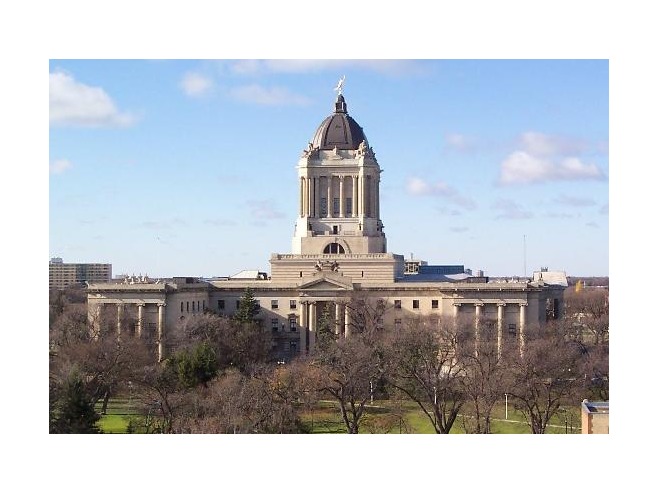
Manitoba Legislature Building, Winnipeg.
The Honourable James Allum, Minister of Education and Advanced Learning
UM Today caught up with newly appointed Minister of Education and Advanced Learning the Honourable James Allum to ask him about his thoughts on Winnipeg, education, the importance of graduate students, archives – and the weather.
The current MLA for Fort Garry-Riverview has been a Winnipegger for almost two decades, and he and his family are proud to call the city and province home. Minister Allum is also a Ph.D. in Canadian and Environmental History.
Why Winnipeg? I could have taken a sessional job at UNBC (University of Northern British Columbia) in Prince George or work as an archivist for the City of Winnipeg. As soon as I walked into the building at 380 William I said, “I could work here.” I liked the collection. It’s one of the finest municipal collections in Canada and it is a spectacular facility.
On winter weather: It’s cold everywhere in Canada, but to be a true Manitoban and a true Winnipegger you have to be able to deal with the duration of the winter. That was an unbelievable cold snap we were in and if you can survive that you can survive anything. I am a hockey guy. I like winter and I like outdoors.
His academic background: I am an Historian [in fact, Allum moved to Winnipeg in 1996 to work at the City of Winnipeg Archives]. I love the past in terms of helping people understand why things are the way they are today and I have a genuine love of political and environmental history.
His connection to the U of M: I have been to the archives and special collections at University of Manitoba. Shelley Sweeney was one of the first people I met when I got here. She was a friend and a mentor in helping me to understand the archival dynamic in Manitoba. Shelley helped me to fit in because I wasn’t an archivist. I spent a lifetime in archives, but I didn’t know how to run them.
The role of U of M as a community builder: All of our institutions, including University of Manitoba, have an obligation to engage with their wider neighbourhoods. This is clearly happening around the evolution of the campus. It is also about engaging community, broadly speaking on ideas, trends and helping us to determine the way forward as a community as we progress into the 21st century.
On the new Department of Education and Advanced Learning: By combining the two departments into one, we are now able to talk seriously about the continuum of education from Kindergarten to career. We are now able to connect those binary points all the way along the system which is difficult to do when you have two departments. If your K-12 kids aren’t doing well then they won’t perform well in postsecondary education and if the postsecondary world isn’t consistent with what we are doing in the K-12 sector then universities will find themselves in isolation.
What he’s discovered so far, but knew already: All across the system, K-12 and post secondary, fantastic things are going on in classrooms every single day. Our goal is to ensure that these great things keep happening each day. We want our institutions to play to their strengths – to do well in what they do well – and we want better system coordination. That helps to promote economies of scale and produces better, more meaningful outcomes for students.
On the value of prior experiences: [My experience as] Chair of COPSE was indispensable and helped me to understand: how universities are administered; got to know the people involved and helped to build up my credibility with those people who didn’t know me. All of that background served me well and I knew how to get off the starting line and run – (I) didn’t have to learn how to run.
What he sees as the biggest challenge: Our agenda is jobs and the economy and developing a skills agenda to create good jobs for young people to stay here and live in Manitoba. But at the heart of that is education. The challenge for the education sector is to continue doing well what they are doing well, but also to adjust so we are providing students with those opportunities for good jobs. We are doing lots of that, but we still need to be evolving and growing.
On the importance of graduate students: Graduate students are critical…they provide a rich source of research and growth in universities that takes us to new areas and new places. Having been a grad student, with three kids under the age of 8, I finished my Ph.D. and lived the life that most graduate students do. I am very empathetic to where they are and try to be as supportive as we can. We are trying to make sure that graduate students are well placed to pursue their studies and contribute to their wider communities.
Most exciting development so far in the new role: The willingness on the part of the post secondary sector to engage in that conversation on system coordination in order to get the best possible outcomes for our students. I am pleased and delighted that everybody and, certainly Dr. Barnard, for saying we (the University of Manitoba) are part of that conversation and we are rowing the boat together. I have really good feedback and am really pleased that we will be doing this together; that’s when we will get the best outcomes.






